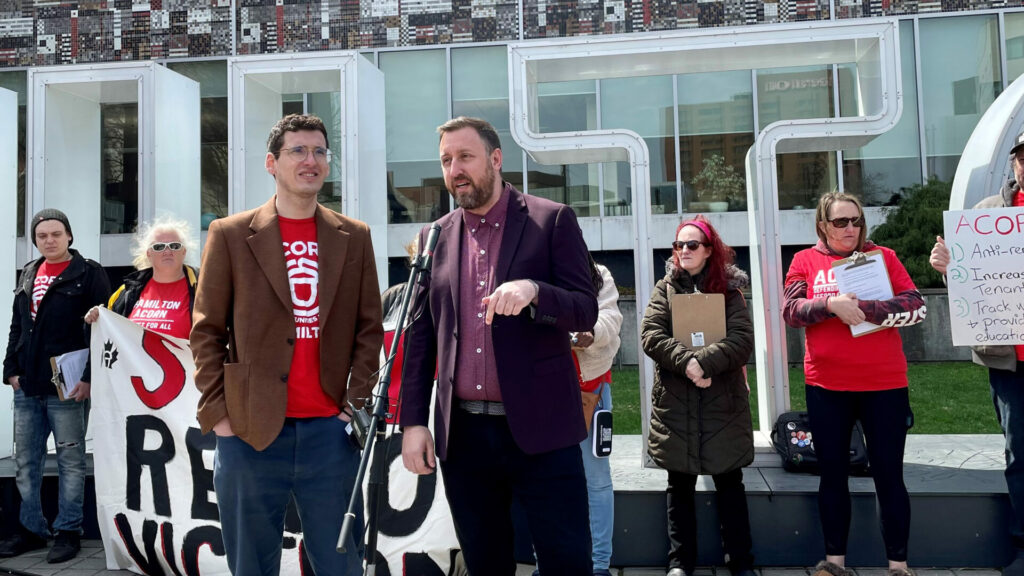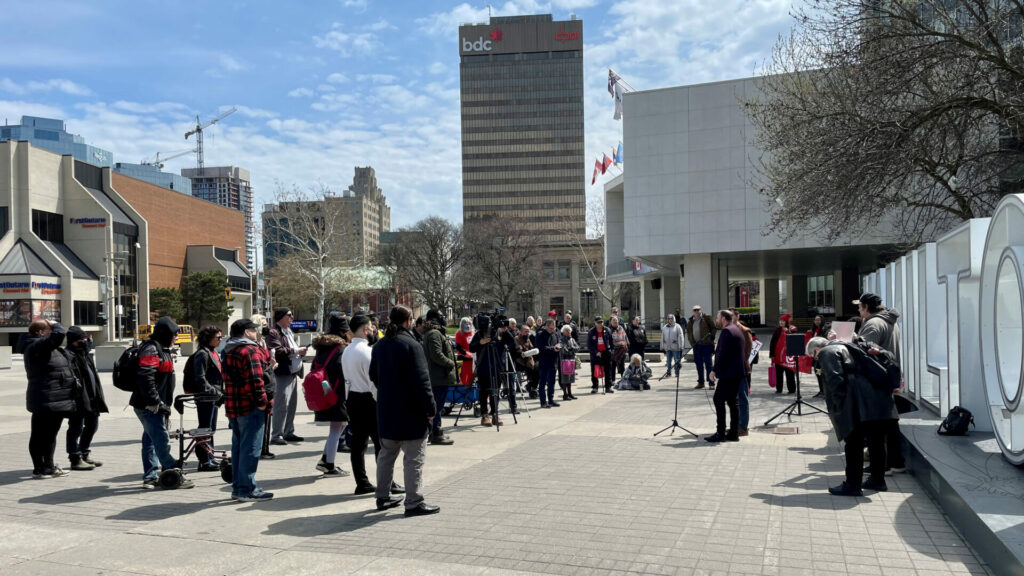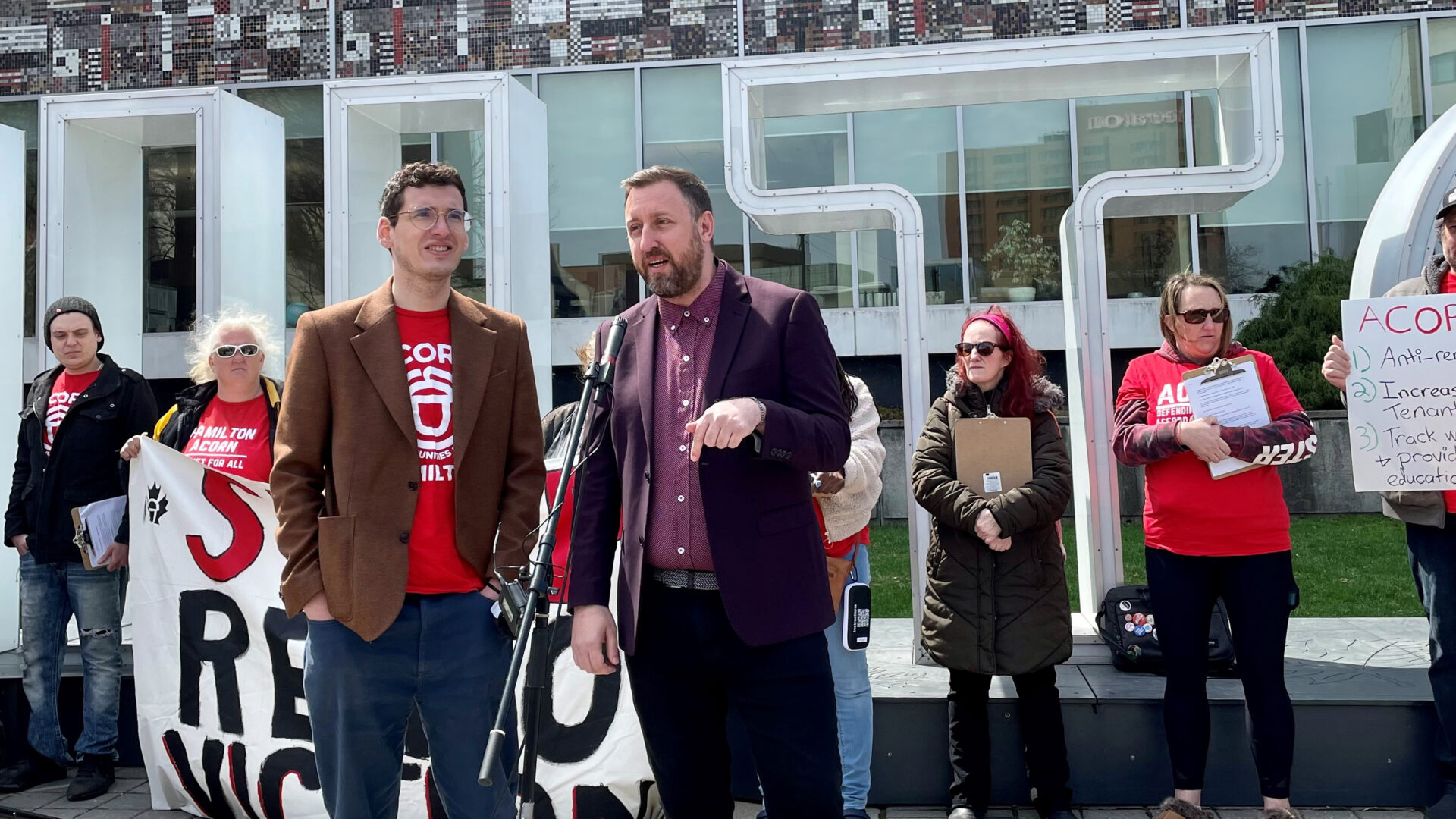TVO Today: ‘An urgent priority’: How can cities crack down on bad-faith renovictions?
Posted May 29, 2023
Advocates say there’s a growing trend of landlords evicting tenants to raise the rent — and they’re calling on municipalities to take more action
HAMILTON — The city has a renoviction crisis, Evan Pettit told councillors on April 20. He has lived in a multiplex in the east end since 2019 and pays $743.12 in rent. But in 2021, he said, a new owner bought the building and issued N13s — notices that declare a landlord wants to end a tenancy to demolish a rental unit, repair it, or convert it to another use. He said the notice came with an offer of three months’ rent in exchange for waiving his right of first refusal to return to the apartment post-renovation.
“I am on ODSP due to losing my leg to cancer in 2015,” said Pettit, one of nearly 40 delegates to the Emergency and Community Services Committee, which met that day to discuss long-awaited staff and consultant reports on renovictions. “I’m in close proximity to both my oncologist and my prosthetist, and moving is not feasible.”
The rent he pays is close to the maximum housing allowance he can receive from the program, he added. It’s also well below the average asking rent in the city: $1,875 for a one-bedroom unit or $2,262 for a two-bedroom, according to listing website Rentals.ca.
Although definitions vary, “renoviction” generally describes a process by which a landlord evicts a tenant in order to renovate a unit. Ontario’s Residential Tenancies Act permits property owners to terminate tenancies if their unit requires repairs or renovations that necessitate a building permit and vacant unit. The act sets out rules for how such an eviction can occur. When these rules are not followed, the result is a bad-faith renoviction. City of Hamilton Housing Services Division defines the practice as occurring “when a landlord in bad faith undertakes legal renovations or uses the proposal of renovations to evict a tenant from their unit in order to rent the unit at a higher price with or without improvements. When bad-faith renovations occur, the landlord works to circumvent the Residential Tenancies Act and avoid allowing the tenant to move back into the renovated unit at their previous rental rate.” According to the City of Toronto, “there is an increasing trend of some landlords serving this eviction notice to tenants as a way to get them to move out so they can re-rent the unit at a higher rent.”
In Ontario, tenants have the right to move back to their units at the same rent, but they must notify the landlord in writing of their intention to do so. (Under legislation proposed by the Ford government, tenants who claim the right of first refusal would be given notice of the unit’s readiness for occupancy and a 60-day window during which they could move back in.) If they choose not to return, they’re entitled to compensation equal to three months’ rent or one month’s if the landlord has fewer than five residential units. In some cases, a property owner could instead offer accommodations in another unit. Ryan Hardy, a lawyer with the Advocacy Centre for Tenants Ontario, says that, while there isn’t a great deal of solid data about this, he believes such cases are rare: “The more common thing is people get the compensation.” Although the RTA provides options that allow tenancies to continue, he says, “practically, it’s just not that way — it’s woefully insufficient for the problems we’re facing.”
Hamilton city council is looking at further strengthening the rules. Since at least December 2020, it’s been discussing how to prevent unnecessary renovictions — and much of the conversation has centred on the idea of adopting a bylaw similar to the one introduced in New Westminster, British Columbia, in 2019.
Councillors have directed city staff to develop “a full suite of options to halt renovictions,” including the adoption of such a bylaw. Staff are due to report back in August.
So what do we know about renovictions in Hamilton, what’s in the New Westminster bylaw, and what room is there for an Ontario municipality to make its own laws regarding landlords and tenants?

“More widespread” than people know
Karen Andrews, a lawyer at the ACTO, represents tenants who allege that their landlords are improperly trying to evict them. As things stand, she says, long-term tenants are particularly at risk due to the profit motive that’s often involved in renovictions (in Ontario, landlords are allowed to raise rents any amount between tenancies).
One of her clients, she says, was evicted from a Toronto property in which the landlord is now renting renovated units for $2,800 per month. “I could not afford to live there,” Andrews says. “I’d be pinched, because eating is habit-forming.”
According to the consultants’ report on renovictions that Hamilton commissioned, “issuance of N13 notices began to climb sharply in 2016, and increased an astounding 775 per cent between 2010 and 2021.” It notes that about 62 per cent of the notices occurred in places where housing stock is relatively old.
The report notes that those numbers do not show whether renovations were carried out or necessary, whether they could have been conducted without displacing tenants, or whether property owners had informed tenants of their rights and options. The data also does not capture improper evictions conducted without the issuance of N13s. “At the City level, there is a lack of data on renovictions in Hamilton,” it reads.
Arun Pathak, president of the Hamilton District Apartment Association, which represents landlords and sent a letter to councillors outlining its arguments against an anti-renovictions bylaw, says he does not believe the problem of bad-faith renovictions is widespread. “I think it’s a fairly small problem. A lot of the evictions that are taking place are for genuine renovations,” Pathak says, adding that, as buildings in the city age, renovations are increasingly needed. The sense that there is a growing issue has “all come from anecdotal information that has come from a few tenant groups that are very vocal on this issue,” he says. “I don’t really see the factual evidence that this is a major problem.”
But Brian Doucet, Canada Research Chair in Urban Change and Social Inclusion and a professor in the School of Planning at the University of Waterloo, says that anecdotal evidence is abundant. In his recent research, for which he interviewed more than 100 renters in Hamilton, he heard stories of renovictions and of tenants’ fears of losing affordable housing: “This has been going on for a long time, and this is far more widespread than people most people would realize.”
The B.C. example
According to Alexandra Flynn, an associate professor at the University of British Columbia’s law school, New Westminster’s 2019 renoviction bylaw put in “quite stringent requirements” for landlords to ensure tenants had housing during renovations. The premise was that tenants should be able to live in their units during renovations and that landlords would have to apply to the city in circumstances in which that was not doable. Property owners also had to provide temporary accommodations to a tenant during renovations.
Following the bylaw’s passing, landlords took the city to court, arguing it did not have the authority to regulate residential tenancies in that manner. “It’s definitely the question of ‘What can municipalities do?’ given that provinces regulate this area,” Flynn says.
Both levels of provincial court upheld the bylaw before the city repealed it in 2021, when B.C. enacted provincial legislation incorporating many of the same protections.
Pathak says it’s not the city’s job to regulate around tenancies: “We should not be trying to find a workaround to infringe on the province’s business.”
But Flynn points to the theory of subsidiarity: that social and political issues should be dealt with at the most immediate level of government. “[Municipalities] in these cases, are really putting themselves out there and regulating in an area where at least, on a pure constitutional basis, it looks like it’s really the province’s job,” she says. “[They’re] needing to go to court and defend themselves and what they’re introducing. I think it’s a good-news story that we have local governments that are acting the way they should in identifying gaps and using the information that they have at their disposal to introduce some kind of regulatory framework.”
Hamilton’s way forward
The April city staff report takes the view that, unlike New Westminster, Hamilton does not have the authority to legislate on this matter: “In Ontario, residential tenancies are under the exclusive jurisdiction of the province and matters of dispute are under the exclusive jurisdiction of the Landlord Tenant Board.”
In advance of the April meeting, ACORN, an independent national organization of low- and moderate-income tenants, submitted a letter to council outlining a different position. Written by lawyer Claire Michela of the firm Ravenlaw, the letter argues Hamilton could enact a similar bylaw. “In our view, the differences between British Columbia’s legislation and Ontario’s Municipal Act are unlikely to yield a different result if a similar by-law in Ontario was created and challenged,” it reads. “If properly drafted, such a by-law would be unlikely to run afoul of the City’s authority within the Municipal Act and would be very unlikely to frustrate the purpose of the [Residential Tenancies Act]. The case law has consistently confirmed that the scope of municipal authority is broad, and challenges to cities’ by-law making powers are rarely successful.”
Michela writes that a bylaw limiting renoviction would not conflict with existing tenancy rules, “because the RTA does not require or even encourage renoviction, it merely provides conditions for permissible renoviction.”

Andrews tells TVO Today that she thinks the Ravenlaw letter “holds a lot of water.” Andrews delegated to the ECSC in April, telling councillors they should enact a New Westminster-style bylaw: “Be bold. Take it out for a spin.”
It could be that the staff opinion is correct and that the city can’t do this, but as a lawyer, you never really know how litigation will go, Andrew says, and “sometimes you have to have that fight. I wouldn’t stake my second mortgage on the success of this bylaw, but I might bet you $1,000.” She adds that the outcome of a legal challenge to the city introducing such a bylaw could include shaming bad landlords or getting the province more involved.
Pathak says he believes the city should focus its efforts on income support and education for renters and explore programs to help landlords cover renovation costs. “Some sort of a publicity campaign to make [the right to return] more readily known would help, as would following up and assisting people who need the help,” he says. “But to bring in another layer of bureaucracy that the landlord has to go through to be able to update their property is not good for the health of the rental-housing stock.”
Andrews stresses that solutions must be pursued without delay. Recent research has found affordability is declining — for each unit of new affordable housing built in the city, Hamilton has lost 29. “This is an urgent priority in places like Hamilton,” Andrews says, “because Hamilton used to be an affordable place to live.”
And, Doucet notes, the stakes are high. “The city has declared a homelessness emergency,” he says. “Where do you think people who have been renovicted and have nowhere else to go will end up? You don’t have to draw a big line between those two.”
****
Article by Saira Peesker for CBC News

